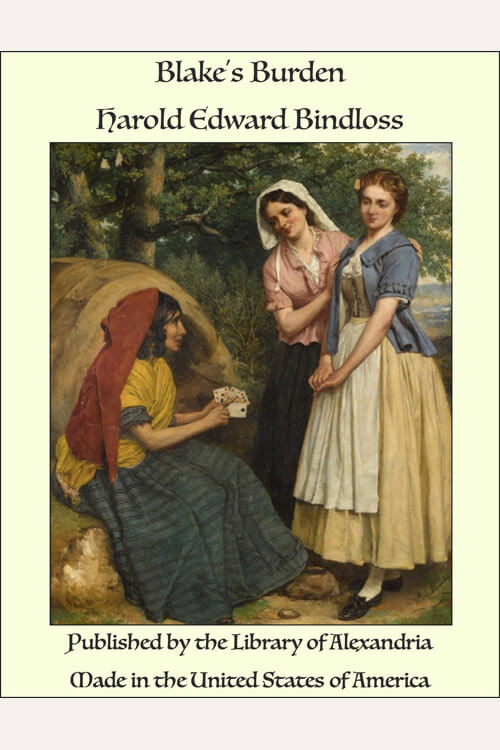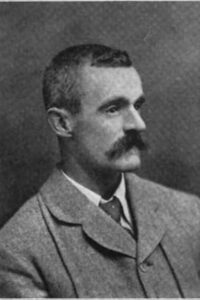
Blake’s Burden
“They’ll no doubt be able to offer us all that we require, and I never pamper myself,” Mrs Keith replied. “It’s now and then a relief to do something opposed to the luxuriousness of the age.” This was a favourite topic, but she broke off as a man approached her, carrying one or two small parcels belonging to the girl at his side. He was a handsome, tall, rather spare man with dark eyes and a soldierly look. His movements were quick and forceful, but a hint of what Mrs. Keith called swagger somewhat spoiled his bearing. She thought he allowed his self-confidence to be seen too plainly. The girl formed a marked contrast to him; she was short and slender, and her hair and eyes were brown, while her prettiness, for one could not have called her beautiful, was of an essentially delicate kind. It did not strike one at first sight but grew upon her acquaintances. Her manner was quiet, reserved, and dressed in white, but when she turned and dismissed her companion, her pose was graceful.
Then she handed Mrs. Keith some letters and papers. “I have been to the post office, and Captain Sedgwick made them search for our mail,” she said. “It came some time ago, but there was a mistake in not addressing it to the hotel.” Mrs. Keith took the letters and gave Mrs. Ashborne an English newspaper, but the girl continued: “The bobcat has torn a hole in the basket, and I’m afraid it’s trying to get at the mink.” “Tell some hotel people to take it out at once and see that the basket has been sent to be amended.” The girl withdrew, and Mrs. Ashborne looked up. “Did I hear aright? She said a bobcat.” “You did. I am making a collection of smaller American animals, and a bobcat is like a big English ferret. It has high hindquarters and walks with a curious jump, which is why it got its name. I’m unsure if it lives in Canada, but an American got this one for me. I find natural history interesting.”
Read or download Book
Harold Bindloss
Harold Edward Bindloss (6 April 1866 – 30 December 1945) was an English novelist who wrote many adventure novels in western Canada and some West Africa and England.
Biography
His writing was firmly based on his experience, whether as a seaman, a dock worker, a farmer, or a planter. Bindloss was born on 6 April 1866 in Wavertree, Liverpool, England, the eldest son of Edward Williams Bindloss (born c. 1838), an iron merchant with six men in his employ at the time of the 1881 census. Bindloss had three sisters and four brothers. He spent several years at sea and in various colonies, especially in Africa, before returning to England in 1896. His health was broken by malaria. Bindloss was absent from the family home in 1881, but the 1891 census found him living at home and serving as an iron merchant’s clerk, presumably for his father. He began work as a clerk in a shipping office, but this did not suit his adventurous spirit, and he was at various times a farmer in Canada, a sailor, a dock worker, and a planter.
He returned to England in 1896, presumably from West Africa, as he returned sick of malaria. Given that he spent more than a decade at sea and in the colonies, it seems likely that his experience abroad was in two parts, first as a youth and then as a young man after 1891. After returning home in 1896, he began working as a journalist. Then he wrote two non-fiction books based on his travels, the first, In the Niger Country (1898, Blackwood & Sons, Edinburgh) about West Africa, and the second, A Wide Dominion (1899, T. Fisher Unwin, London) about Canada. His first novel was Ainslie’s Ju-Ju, set in West Africa. Truth is “a book with the double interest and excitement of a story and of a genuine record of travel and adventure mixed together judiciously.” This was the first of nearly one hundred novels by Bindloss. The next A Sower of Wheat (1901, Chatto and Windus, London) was set in Canada. This set the pattern for Bindloss, as most of his novels were in Canada or West Africa. The Guardian refers to him as having two strings to his bow, stories set in Canada or West Africa, with the Canadian stories being remarkably superior. Bindloss married Mary Simpson Hossack (11 Mar 1869 – 2 November 1945), the youngest daughter of Captain Joseph Hossack, a marine surveyor, at St James Church in West Derby, Lancaster, on 12 June 1899. The couple appears not to have had any children, as the 1911 census records them as not having had any after twelve years of marriage. Bindloss was a prolific author. The most common obituary estimate is that he wrote over 40 novels. ABC Bookworld lists 62 books by Bindloss. Kemp states that he wrote two to three books annually in the early 1900s.
The Belfast Newsletter states that he published 67 books. However, Jisc Library Hub Discover lists 89 books by Bindloss, the first two being non-fiction and the rest novels. He is remembered in the name of the town Bindloss, Alberta, Canada, established by the Canadian Pacific Railroad in 1914. Bindloss died on 30 December 1945 at Chertsey Hill Nursing Home in Carlisle, England. He had been living at Vallum, Burgh-by-Sands, in Cumbria. His estate was valued at £24,774 0s. 9d. His wife had died at home on 2 November 1945, and he was granted probate as her executor just a fortnight before he died.






